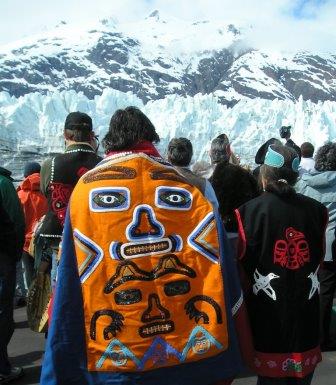
Glacier Bay is the ancestral and spiritual homeland of the Huna Tlingit.
Interviewees identified a number of "tangible" adverse effects, many of which NPS directs extensive research efforts toward including: air and water pollution, trash dispersal, noise pollution, wakes, fish and wildlife disturbances, various impacts on Tlingit boaters, and increased region-wide exposure to shipborne diseases. But as importantly, Huna interviewees described a range of "intangible" adverse effects that may be unique to the culture and traditions of the Huna Tlingit. For example, Huna interviewers described their perception that some ship passengers exhibit disrespectful behavior to homeland, that ships may disrupt Huna people's unique connections to Glacier Bay, and that some interpretive programming aboard ships is inappropriate.To some, the ships themselves are potent reminders of "dislocation" or "displacement" in that the Tlingit homeland is now more frequently visited by others than by traditionally associated people.
Conversely, Huna interviewees described the benefits of cruise ships which bring economic opportunities to a rural area and provide opportunities to present Tlingit history and culture, as well as to impart the values of "respect" that are believed to be critical to maintaining a healthy balance in Glacier Bay. Interviewers noted that cruise-ship based interpretive programs offered by Tlingit guides, allow traditionally associated people to serve as "hosts" in their homeland;a concept integral to Tlingit culture.
Deur and Thornton's report provided numerous recommendations most focused on the need to maintain and strengthen conversations between the National Park Service and the Huna people.One tribal elder's comment serves as a poignant reminder that science - and management responses to science - must incorporate the human element:
"I think they'll have a whole different outlook… of everything, if they…sat and listened to us for a little bit.And of course they're professionals at what they do, but we've been what we are for all our lives…"
